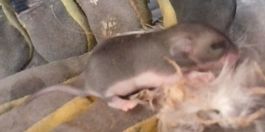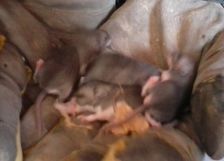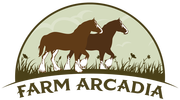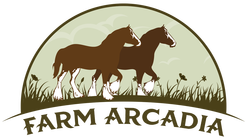 If you live in the country, you already know about the joy of rodents. When we lived in Oregon, we had huge rats that could bloody our 80-pound Weimaraner dogs ... our Jack Russell was more skilled, but took a lot longer. They were ugly with beady eyes too close together and a weirdly long crookedy snout. They were easy to hate ... they destroyed everything and are suspected to be the source of the spark that started the fire that burned out house down. Now that we're here in northern Idaho, we've found all sorts of cuteness. We loved the shrews in Oregon, which live here, too, but they aren't rodents though they are entirely awesome little creatures. There are so many cute mice here and I'd love them except they get in everything. This little squirmy baby is gray on the back with a white belly, huge eyes, and a funny little tail. Mom was a little chibi (cute anime creature) mouse that could be a model for stuffed animals and children's toys. There are also little brown ones, ground squirrels, rats, and all sorts. This is where they are meant to live - in the country - so how do we strike a balance? What do they do?If you aren't naturally squeamish about rodents and recognize how cute they are, controlling their populations may be an issue. When you live anywhere but especially in the country, they can climb into the insulation of your house. Wherever they go, they pee and poop. And, they can pee and poop a lot. After a little while, all your insulation smells like rodent excrement and attracts all sorts of insect. They build nests everywhere and breed faster than rabbits over and over and you have a massive rodent population explosion. I find they are especially interested in my warm house or other shelter in the winter when they are getting out of the rain and snow. In addition to nesting in the house, they will nest in ATVs (engines, air intake areas), storage boxes and bins, seat cushions (like in boats or horse carriages), RV walls and inside the RV, and anywhere they can fit. And, they can fit just about anywhere. They have the amazing ability to compress their skull and body. Why are rodents bad? So what's wrong with these guests besides turning your things into toilets and nurseries? They ruin things. I've heard of some serious damage caused by their gnawing jaws, which are impressive. They've chewed and ruined:
The Fate of These Pups  These squirming little babies embodied mousey cuteness, but were nested in a closed storage bin next to a "new" box of granola bars their mom had eaten through ... nibbled very single one. These squirming little babies embodied mousey cuteness, but were nested in a closed storage bin next to a "new" box of granola bars their mom had eaten through ... nibbled very single one. Despite their undeniable cuteness, their mom had crossed into my turf and needed to go. I wasn't interested in leaving the litter to slowly die. My Weimaraner dogs have a history and current obsession of finding and killing rodents, so I offered the little ones to them. I assumed the dogs would gulp them down in one big swallow. The female pointer sniffed them with great interested before giving them all sweet little kisses. The male did the same. Being the well-trained dogs that they are (they really are) and treat-mongers, I had them sit and tried offering them the mouse pups as treats as a reward for their obedience. They usually love to take pieces of cat food, raw meat, and certain fruits and veggies. Apparently, they weren't fooled and just gave them more kisses. For those of you who think this is horrible, just stop reading. It's not going to get better. It is, however, real life. I didn't want to physically kill them because they were cute fat little babies. But, they were also invading rodents. So, we had an icy puddle. I know you can kill prawns and tilapia by transferring them into ice water (for when we set up our auquaponics greenhouse), so I tossed one in. Wow, was it a good little swimmer. And a persistent little swimmer. I fished it out and dried it off. My goal was not to torture it, but apparently I failed. I resorted to what I had done before with success. There were too many to stomp on all at once and be sure to get them entirely under my foot and killed in one try - they were also a little mobile. I didn't feel like stomping each one, so I got a spade shovel and took a big swing. One smash was enough - lights on, lights off. A few ideas of how to control rodents: #1 - Grow a backbone and make sure you can kill them. I've caught a grown man dumping ground squirrels across the street from my property. This means they were going to cross the road looking for turf and live on my space, dig holes in my pasture to trip up and injure my animals, and destroy my crops. Some may have stayed across the street to damage my other neighbor's property. I'm going to stop there about people dumping things in the country and just say thanks, neighbor. Why don't you grown a backbone? I don't think he was expecting us to drive up while he was emptying his live traps, but we did. I think he thought we would just drive by so he could finish when we left, but we didn't. He denied what we watched him doing. I asked him why he was doing it and didn't kill them. Of course he didn't fess up that he's not suited to acting like the predator all of us humans are and defending his own turf. When I asked him why he didn't kill them, I don't think he expected me to pull out my own gun (a cute little .38) and put one right through the cute little staring eyes of the squirrel. Sissy man. Even though I like the animals, I understand it's not in anyone's best interest to let them overpopulate. I don't usually shoot them. If I did, I would probably favor a 22, but I used what I had with me. I find a shoe is a good option for the smaller ones - reusable with 100% effectiveness if used properly. (Not a flip-flop, but a real shoe or boot.) #2 - Avoid poisons. I've used them before, but they have far-reaching effects you can't take back once they are out there. If you have pets or neighbor pets that may eat them, the poison in the rodents stomach and system that is not metabolized may be enough to kill animals who may eat rodents. (Most dogs love to kill and will eat living or dead rodents.) No pets to watch out for? Consider the wild predators. I want to keep them around, the animals that eat the mice and other rodents, but they are also susceptible to poisoning that kills the mice. This includes raptors of all sorts such as hawks, falcons, kestrels, and owls, snakes, weasels, martins, mink, (ferrets in some places), raccoons, and the young of larger predators who need a little practice or aren't above eating a dead treat they find without knowing it's poisoned. #3 - Use multiple ways to kill them. There are loads of ideas on the internet that work, but some work in certain settings better than others. If you have rodents in a building where it is sheltered, you can give cats who kill mice access as well as setting up traps. Not all cats are This can include live traps baited with food, a bucket with a drop-plank baited with beer in the bottom, traditional mouse traps (watch out for other animals - tongues in traps and little kid fingers can really hurt), and sticky traps. I like the sticky traps, but find the rodents can work their way off, so check them frequently. #4 - Prevent attracting them. It is not always possible to avoid attracting them because they are very resourceful, prolific, and may not be looking for much more than shelter. We seal up all of the edges around our house and property to keep them out. If we find one innovative soul who breaks the barrier, we do what we must to stop it before it breeds and trains up hordes on how to invade. Clean up potential food sources. This means spilled grain, pet food, seeds, etc. We also keep a fair number of animals (cats and dogs) that love to kill them and keep the population reduced around our house. I think their presence helps, but I haven't tried it without them, either. I'm also told that guinea fowl eat rodents, but I haven't witnessed it with ours so far. We also don't kill snakes around us who may help make a dent in the population.
There are so many options! I don't have all the answers as we still have problems with them here and there. We win back our space, let them live in the wild, and don't harm rodent predators that we want to keep around.
2 Comments
6/9/2021 09:29:04 pm
Great article! Thank you for sharing this informative post, and looking forward to the latest one.
Reply
Your comment will be posted after it is approved.
Leave a Reply. |
Mindy HelmsWife to Brandon, mother to Tess and Liam, farmer, entrepreneur, cook & baker, nurse, and accountant who loves to try new things, travel, and work toward greater self-reliance. Archives
May 2024
Categories
All
|

 RSS Feed
RSS Feed
